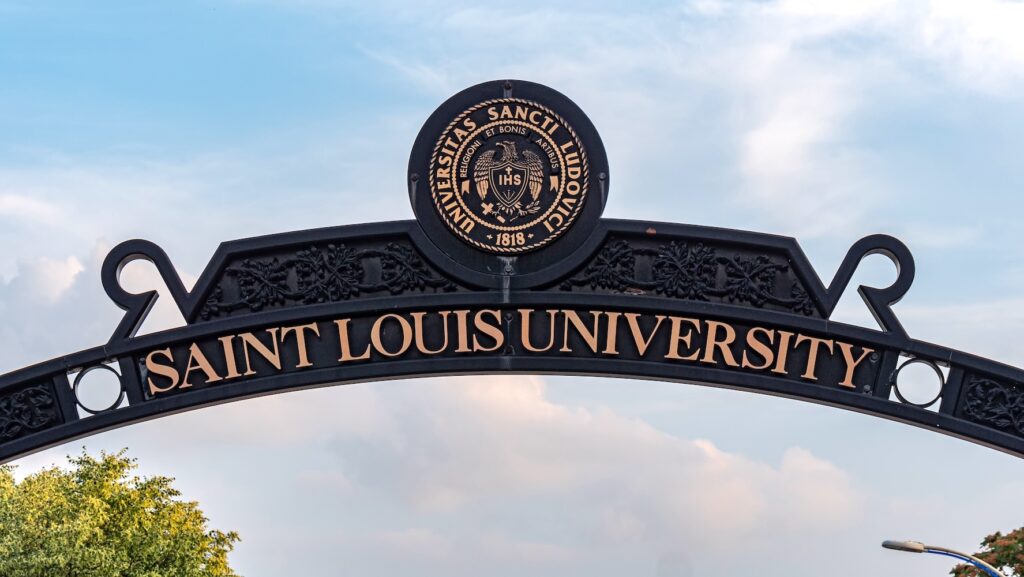Group with radical race connections demanding $70B in slavery ‘reparations’ from small Catholic university in Missouri
A group claiming to represent 200 current descendants of slaves who helped build St. Louis University (SLU) in Missouri are demanding $70 billion in so-called reparations from the school.
The…

A group claiming to represent 200 current descendants of slaves who helped build St. Louis University (SLU) in Missouri are demanding $70 billion in so-called reparations from the school.
The group, called Descendants of St Louis University Enslaved (DSLUE), is represented by civil rights attorney Areva Martin.
St. Louis University is a private, Catholic university run by the Society of Jesus, also known as the Jesuits.
Martin told Fox News Digital how the group arrived at such an enormous figure.
An economist reportedly calculated the reparations for DSLUE using “labor for 24 hours per day, 365 days per year for 70 enslaved people from 1823-1865,” which comes out to $365 million, plus accumulated interest to the present, for a total of $70 billion.
The total dwarfs the school’s endowment of $1.4 billion as calculated in 2023.
“You have to also ask yourself, how come these institutions, with all of their resources, never, ever utilized an economist, a statistician, a labor expert to tell us the value of the wages and the wealth that they accumulated,” Martin told Fox News Digital.
In may be hard to find credible economists willing to stand by such reparations numbers as represented by the DSLUE economists – numbers that would essentially bankrupt and liquidate the university.
Furthermore, the economist used by Martin and DSLUE, Julianne Malveaux, really isn’t a traditional number-crunching economist at all.
She writes politically-charged opinion columns on race that have been pasted into full length books, but has published little, if any, academic research on economics.
For example, in 2018, Malveaux appeared in The Burden: African Americans and the Enduring Impact of Slavery, a book that was forwarded by Nikole Hannah-Jones, author of the controversial 1619 Project, an inaccurate account of the origins of slavery in the U.S.
The Burden is a literary collection, rather than economic research, in which Malveaux writes an anecdotal account of people trying to defend slavery in an essay titled “An Abomination, but You Got Fed”.
Unsurprisingly, Malveaux is also a member of the National African American Reparations Commission, whose top honorary member includes Dr. Rev. Jeremiah Wright, who was well known as former President Barrack Obama’s pastor.
Wright was widely criticized for using blasphemy to condemn America, saying “God damn America” and blaming the U.S. for 9/11, saying “America’s chickens are coming home to roost” about the 2001 terror attack.
Besides the math, reparation supporters also face two legal problems: the statute of limitations, and the inability to prove direct harm to living descendants.
Statutes of limitations are an important protection in democratic societies, according to Richard W. Rahn, chairman of the Institute for Global Economic Growth.
“Other than in some communist countries, crimes that ‘reach beyond the grave’ are not prosecuted for good reason,” writes Rahn. “That the sins of the father should not be vested upon the son is a belief that most civilized societies have practiced for thousands of years.”
Additionally, there is the challenge in providing evidence of direct harm to people today – using statistics on poverty that can also apply to whites, Hispanics and Asians, for example, who were not victims of the African slave trade.
DSLUE’s billon dollar demands appear to be years in the making.
In 2016, SLU published its “Slavery, History, Memory and Reconciliation Project,” which was undertaken “in partnership with descendant communities,” according to the project website.
Then in 2019, the university informed some descendants of slaves that their ancestors may have been forced to work at the first Jesuit mission in Missouri, St. Stanislaus, SLU, St. Francis Xavier College Church and other local churches, farms and schools, said Spectrum Local News St. Louis.



